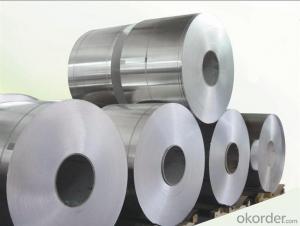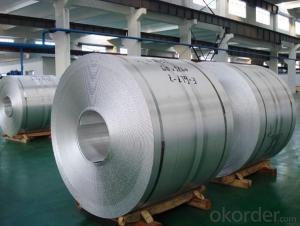DC Aluminium Strip in Coil AA3003 Temper F
- Loading Port:
- Shanghai
- Payment Terms:
- TT OR LC
- Min Order Qty:
- 80 m.t.
- Supply Capability:
- 60000 m.t./month
OKorder Service Pledge
OKorder Financial Service
You Might Also Like
1.Structure of Product Description
DC Aluminium Strip in Coil is one semi-finished aluminium material. This strip can be rolled down to aluminium coil,sheet,circle ect. The alloy AA3003 is widly used in beer can. Its weight is much lower than steel. Moreover, it can be recycle used.
2. Main features of the product
a.Competitive price
b.Professional after-sale service
c.Fast delivery time
3.Image
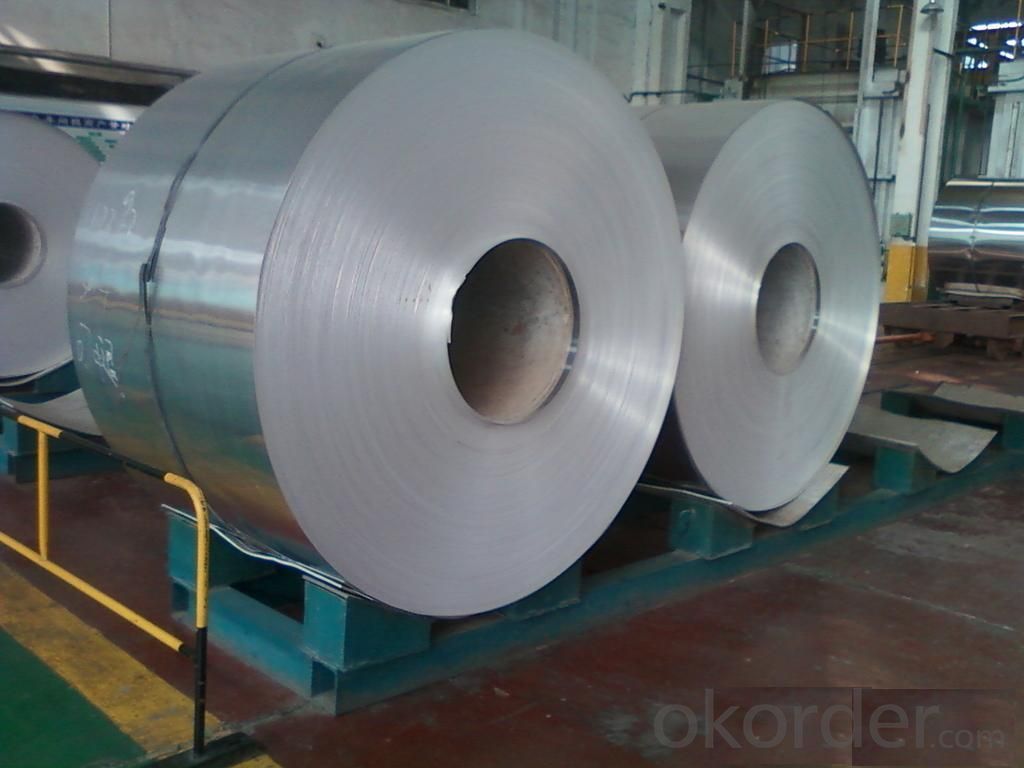
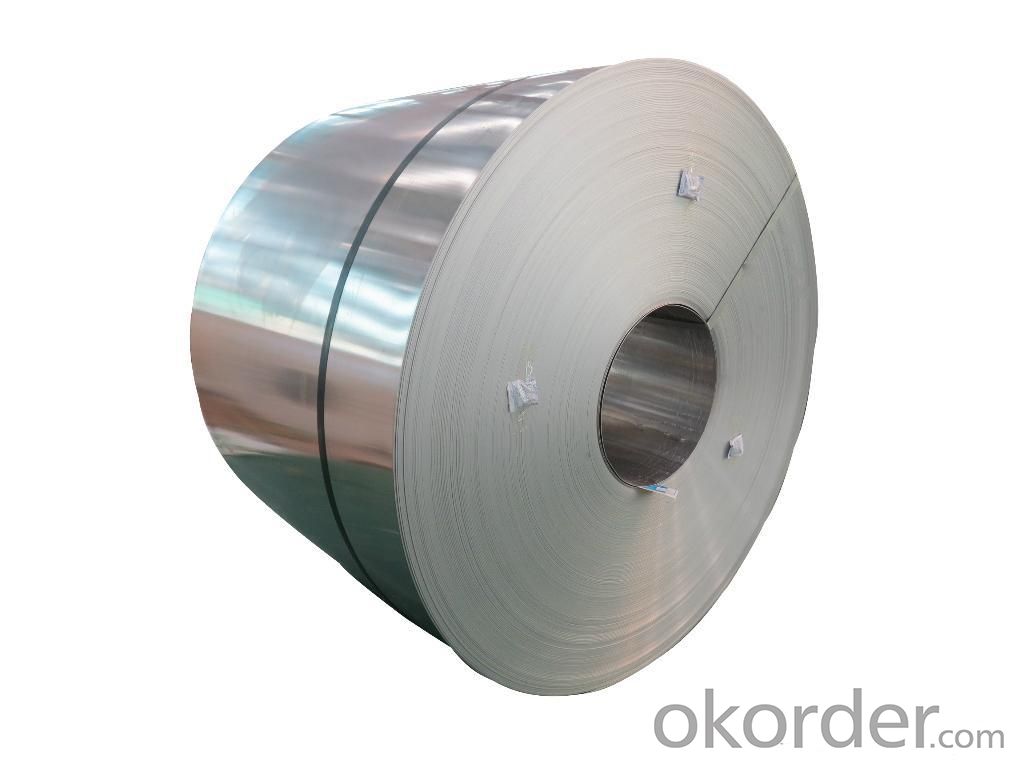
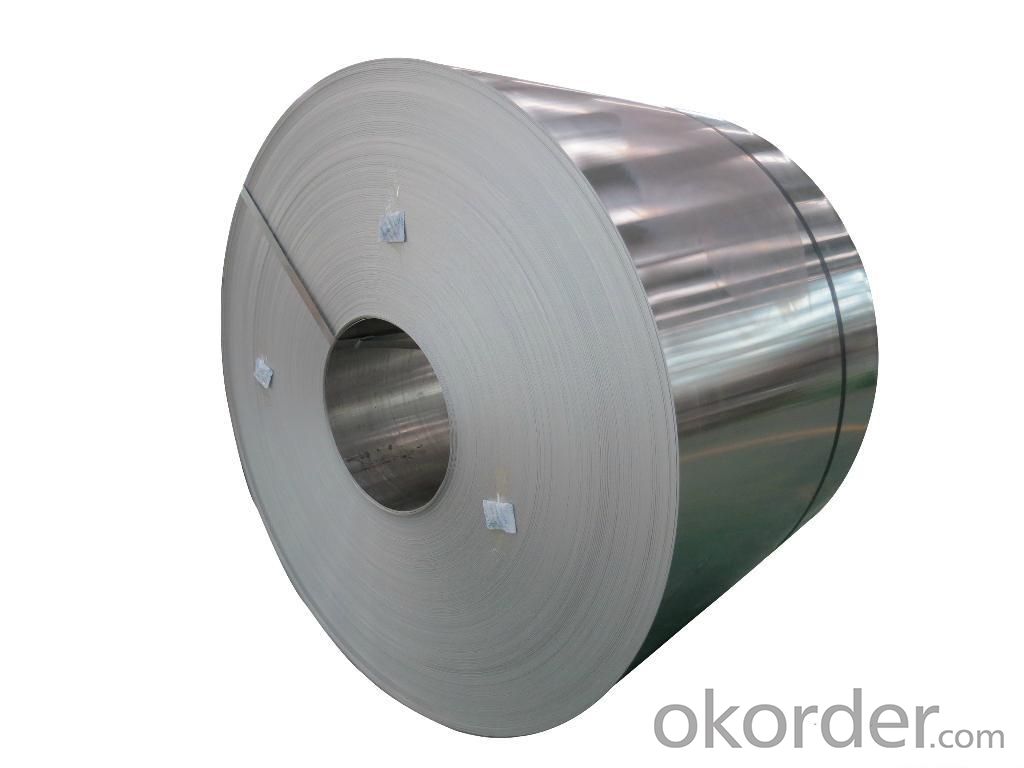
4.Product Specfication
| Alloy | Thickness | Coil Weight | Coil ID | Temper | Usage |
| AA3003 | 3-8MM | 5-6 MT | 610MM | F | Beer Can |
5.FAQ
What is the quality standard?
---Usually our standard is GB3880-2006
What is the largest width?
---It is 2300mm
What is the MOQ?
---Usually we can accept 80 tons.
- Q:How are aluminum coils used in the automotive industry?
- Aluminum coils are widely used in the automotive industry for various applications, including the manufacturing of car bodies and parts. They are used in the production of lightweight vehicles, as aluminum is lighter than steel, which helps improve fuel efficiency and reduce emissions. Aluminum coils are also used in radiators, air conditioning systems, heat exchangers, and other cooling components due to their excellent thermal conductivity. Additionally, aluminum coils are utilized for electrical wiring and connectors in cars, as they provide good electrical conductivity. Overall, aluminum coils play a crucial role in enhancing the performance, efficiency, and sustainability of vehicles in the automotive industry.
- Q:Is aluminium a safe metal to put in ones mouth without any side effects?
- The jury is still out on this one. Aluminum in the body has been directly connected as a causal factor for alzheimer's disease. Think about this : Small amounts of it are infused in many of the things we eat and drink every day. Any food or drink item that comes from an aluminum container has small amounts of aluminum that has leached into those items that you then eat/drink. Aluminum cooking pots/pans are said to leach aluminum into the foods that are prepared in them. Even cooking with aluminum foil adds to the amount of aluminum you are slowly accumulating within your body and brain tissues. The amounts of aluminum we take into our bodies in these ways may be individually small and insignificant as far as health hazards are concerned. But when you add them up over the course of a lifetime the amount becomes rather alarming. As far as aluminum dental tools or prosthetic oral devices braces....who knows how much they contribute to health issues associated with one's overall lifetime exposure. Like I said in the beginning, the jury is still out on this one.
- Q:What are the different coil handling options available for aluminum coils?
- There are several coil handling options available for aluminum coils, depending on the specific requirements and preferences of the user. Some of the commonly used options include: 1. Coil Cradles: These are horizontal racks or frames on which the aluminum coils are placed. They provide support and stability to the coils during storage or transportation. Coil cradles are available in various sizes and designs to accommodate different coil dimensions. 2. Coil Cars: Coil cars are mobile platforms equipped with lifting mechanisms that allow for easy movement of aluminum coils. They are commonly used in manufacturing facilities where coils need to be transported between different processing stations. Coil cars can be manually operated or automated, depending on the level of automation desired. 3. Coil Turnstiles: Coil turnstiles are rotating devices that hold multiple coils vertically. They allow for easy access to individual coils without the need for heavy lifting or rearranging. Coil turnstiles are ideal for high-volume production environments where quick coil changeovers are required. 4. Coil Upenders: Coil upenders are specialized equipment used to rotate or flip aluminum coils to change their orientation. This is particularly useful when a coil needs to be loaded or unloaded from a vertical position, or when certain processes require a specific coil orientation. 5. Coil Lifters: Coil lifters are a type of lifting device specifically designed to handle aluminum coils. They typically feature adjustable arms or clamps that securely grip the coil, allowing for safe and efficient lifting. Coil lifters come in various configurations, including manual, semi-automatic, and fully automated models. 6. Coil Tippers: Coil tippers are used to tilt or incline aluminum coils for various purposes, such as facilitating coil feeding into processing machines or enabling easier coil inspection. They can be operated manually or powered by hydraulic or pneumatic systems. 7. Coil Stackers: Coil stackers are used to neatly stack and store aluminum coils vertically. They typically feature adjustable arms or forks that can be raised or lowered to accommodate different coil sizes. Coil stackers help optimize storage space and ensure easy access to coils when needed. These are just a few examples of the coil handling options available for aluminum coils. Each option offers its own advantages and may be suitable for different applications or industries. It is important to carefully consider the specific requirements and constraints before selecting the most appropriate coil handling solution.
- Q:Can aluminum coils be used in the production of military equipment?
- Indeed, the utilization of aluminum coils in the manufacturing of military equipment is possible. The utilization of aluminum, a lightweight and long-lasting substance, provides numerous benefits for military applications. Its high strength-to-weight ratio renders it a popular choice for constructing military vehicles, aircraft, and naval vessels. Aluminum coils possess the capacity to be molded into diverse shapes and sizes, making them adaptable for fabricating various components such as armor plating, weapon systems, and structural parts. Furthermore, aluminum exhibits commendable resistance to corrosion, a crucial attribute for military equipment operating in harsh environments. In general, aluminum coils are a dependable and extensively employed material in the production of military equipment.
- Q:Are aluminum coils suitable for high-reflective applications?
- Indeed, high-reflective applications are well-suited for aluminum coils. Renowned for its exceptional reflectivity, aluminum boasts a reflectance ratio ranging from 80 to 90%. Consequently, it serves as an impeccable material for endeavors necessitating considerable reflectivity, including lighting fixtures, solar panels, and mirrors. Furthermore, aluminum coils may undergo coating or polishing processes to heighten their reflective attributes. Moreover, aluminum possesses the advantages of being lightweight, corrosion-resistant, and having commendable heat conductivity, rendering it a versatile option for diverse high-reflective applications.
- Q:What is the role of aluminum coils in HVAC systems?
- The role of aluminum coils in HVAC systems is to transfer heat between the indoor and outdoor units. These coils contain refrigerant that absorbs heat from the indoor air, which is then transferred to the outdoor coil to be released. This process allows for efficient cooling or heating of the indoor space.
- Q:How are aluminum coils used in the production of HVAC components?
- The production of HVAC components relies heavily on the use of aluminum coils, which play a crucial role in the process. These coils are utilized in HVAC systems to facilitate heat transfer, contributing to both heating and cooling applications. In air conditioning units and heat pumps, aluminum coils are commonly employed within HVAC systems. They form an integral part of the refrigeration cycle, enabling the transfer of heat from one area to another. Acting as the key component in the heat exchanger, the coils are responsible for absorbing heat from indoor air during the cooling process, or releasing heat into indoor air during heating. The process commences with the circulation of refrigerant, a substance that passes through the coils, absorbing and releasing heat. When the HVAC system is in cooling mode, the aluminum coils function as an evaporator. Warm air from the indoor space passes over the coils, and the refrigerant within absorbs the heat, effectively cooling down the air. This cooled air is then circulated back into the room, providing a comfortable environment. Conversely, during heating mode, the aluminum coils operate as a condenser. The refrigerant, having absorbed heat from the external environment, flows through the coils. The cooler air from the indoor space moves over the coils, causing the refrigerant to release its heat. This heat is then distributed throughout the room, ensuring a warm and cozy atmosphere. The utilization of aluminum coils in HVAC systems offers numerous advantages. Aluminum is lightweight, enhancing the portability and ease of installation of HVAC units. Additionally, aluminum possesses excellent thermal conductivity, enabling efficient heat transfer. As a result, energy efficiency is improved, leading to reduced operating costs of the HVAC system. Furthermore, aluminum coils exhibit high resistance to corrosion, ensuring their durability and longevity. They can withstand harsh environmental conditions, including humidity and exposure to chemicals, without deteriorating. This makes aluminum coils a reliable and cost-effective choice for HVAC manufacturers. In conclusion, aluminum coils play an indispensable role in the production of HVAC systems, facilitating efficient cooling and heating functions through the process of heat transfer. Their lightweight nature, excellent thermal conductivity, and resistance to corrosion contribute to the overall performance, energy efficiency, and durability of HVAC units.
- Q:Are aluminum coils suitable for high-temperature applications?
- High-temperature applications are generally not suitable for aluminum coils due to their low melting point of approximately 660 degrees Celsius (1220 degrees Fahrenheit). Aluminum, despite its advantageous properties like lightweight and corrosion resistance, cannot withstand the extreme heat associated with such environments. In contrast, materials with higher melting points like stainless steel or nickel alloys are often preferred for high-temperature settings. These materials can endure higher temperatures without compromising their structural integrity or experiencing significant deformation. However, it is important to note that certain aluminum alloys have been developed to possess improved high-temperature properties. These alloys incorporate elements like copper, magnesium, or zinc, which enhance their strength and heat resistance. As a result, these specialized aluminum alloys may be suitable for specific high-temperature applications that require their unique properties. To summarize, standard aluminum coils may not be appropriate for high-temperature applications, but specialized aluminum alloys are available to offer better performance in elevated temperature environments. It is crucial to consider the specific temperature requirements and consult experts to determine the most suitable material for a particular high-temperature application.
- Q:How are aluminum coils annealed?
- Aluminum coils undergo a heat treatment process called annealing, which is typically used to soften the metal and enhance its ductility. This process involves heating the coils to a specific temperature and gradually cooling them. To start the annealing of aluminum coils, thorough cleaning is required to eliminate any impurities. Then, the coils are placed in a furnace that is heated to the desired temperature. The duration and temperature of the annealing process depend on the specific grade and thickness of the aluminum being treated. Once the coils reach the desired temperature, they are maintained at that level for a specific period. This allows the internal structure of the aluminum to become more uniform and relieves any internal stresses that may have occurred during manufacturing. After completion of the annealing process, the coils are slowly cooled within the furnace. This gradual cooling is crucial to prevent the development of new internal stresses. Once the coils reach room temperature, they are ready for further processing or utilization. In some instances, an additional process called quenching may follow annealing. Quenching involves rapidly cooling the aluminum by immersing it in a medium like water or oil. This can further enhance the mechanical properties of the aluminum, such as its strength and hardness. Overall, the annealing process for aluminum coils is a meticulously controlled heat treatment that aims to enhance the metal's properties and make it more suitable for various applications.
- Q:How would our life on planet earth be modified if there was no aluminum at all? Examples welcomed.
- Heavier. Technology would progress a lot slower because much of the stuff we take for granted is made possible by strong yet light materials such as aluminum.
1. Manufacturer Overview |
|
|---|---|
| Location | |
| Year Established | |
| Annual Output Value | |
| Main Markets | |
| Company Certifications | |
2. Manufacturer Certificates |
|
|---|---|
| a) Certification Name | |
| Range | |
| Reference | |
| Validity Period | |
3. Manufacturer Capability |
|
|---|---|
| a)Trade Capacity | |
| Nearest Port | |
| Export Percentage | |
| No.of Employees in Trade Department | |
| Language Spoken: | |
| b)Factory Information | |
| Factory Size: | |
| No. of Production Lines | |
| Contract Manufacturing | |
| Product Price Range | |
Send your message to us
DC Aluminium Strip in Coil AA3003 Temper F
- Loading Port:
- Shanghai
- Payment Terms:
- TT OR LC
- Min Order Qty:
- 80 m.t.
- Supply Capability:
- 60000 m.t./month
OKorder Service Pledge
OKorder Financial Service
Similar products
New products
Hot products
Related keywords

